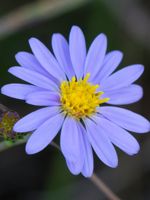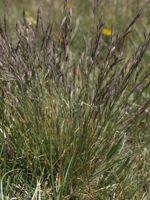Mon-Fri 9am - 5pm Mountain time
Smooth Aster vs Rocky Mountain Fescue
Symphyotrichum laeve
Festuca saximontana
NOT AVAILABLE THIS SEASON - MIGHT RETURN
CUSTOM GROW
Smooth Aster is a native perennial wildflower known for its violet-blue, daisy-like flowers. They bloom later in the season, from late summer to early fall. The flowers attract a variety of pollinators, including bees, butterflies, and other beneficial insects. It also serves as a host plant for the Silvery Checkerspot (Chlosyne nycteis) and Pearl Crescent (Phyciodes tharos) butterflies, further enhancing its ecological value. This easy-to-grow wildflower is well suited for native wildflower gardens, pollinator gardens, and naturalization projects.
The Smooth Aster’s non-aggressive root system allows it to spread slowly, and it is more likely to reproduce by seed, which can be controlled through deadheading.
Rocky Mountain Fescue is a native perennial bunchgrass recognized for its fine-textured clumps and adaptability to harsh environments. It grows well in dry, rocky, and nutrient-poor soils and is highly cold-tolerant, making it well-suited to both prairie and alpine habitats. Its fibrous root system contributes to soil stability and helps reduce erosion on slopes and shallow soils.
Widespread across western and northern North America, Rocky Mountain Fescue is an important component of many prairie and alpine ecosystems. It contributes ground cover and organic matter that support soil function, provides cover for small wildlife, and offers moderate forage for grazing animals. Hardy and versatile, it is used in ecological restoration, naturalization, and habitat enhancement projects, particularly in upland and alpine landscapes.

